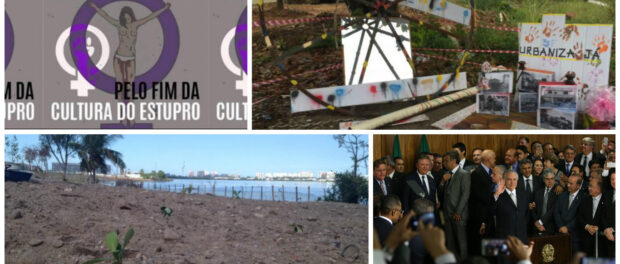
May brought intensified mainstream media coverage to Rio’s favelas focused on the recent uptick in violence across the city, but significant social policy changes and ongoing struggles for housing and education rights were important stories this month too. To help our readers digest the major news and themes of the past month, we’ve summarized the stories we published here on RioOnWatch along with a few other must-reads in the media on favelas. Access past monthly summaries here and full digests here.
As Rio grapples with a spike in murders, Jailson de Souza e Silva of the Favelas Observatory reflected on the ‘demonization of the other’ that sustains acceptance of poor, black youth’s deaths. His message is pertinent to the brutal gang rape of a 16 year-old in Santa Cruz, which stoked a heated national conversation about the banality of rape culture in Brazil.
Activist-blogger Marcelo Castañeda argues that guaranteeing favela residents the right to life is the most urgent and essential political reform needed. In a period of intensified conflict police suffer too, and research shows Rio’s Military Police have higher rates of suicide than the rest of the population. The ComPosições Políticas art exhibit responded to the question of State violence and its representation in the media, while one of the exhibits itself sparked controversy over racism in representations of violence.
The exhibit also featured Vila Autódromo, where construction on new houses has begun and will leave very little of the original favela behind. Two great successes this month, however, were the launch of the Evictions Museum and the awarding of the Rio State Assembly’s first-ever Dandara Award to former resident Heloisa Helena for her struggle.
On a visit to Parque Carioca public housing RioOnWatch heard from former Vila Autódromo residents who are frustrated with their new lives there. Meanwhile, remaining residents of Praia do Sossego faced the threat of imminent eviction without a guarantee of public housing as compensation, and 83% of Niterói families displaced in landslides in 2010 still await promised housing. The right to housing is guaranteed at all levels of Brazilian law. But challenges facing ongoing urban occupations from São Paulo to Rio show that right is not truly guaranteed for all.
Occupations continue at State public schools too, with Rio student occupiers connecting in solidarity with counterparts in other states as aggression towards their activism rises.
This past month also saw rising concerns about the interim president’s policies threatening key social programs including public housing and PAC investment projects. The city’s stalled Morar Carioca program may still be implemented in Pica-Pau and neighboring communities following a launch this month. After years of waiting, however, residents hesitate to raise their hopes. Other failed Olympic legacy projects include the abandoned promise to plant 24 million trees and the collapse of the popular bike path.
CatComm and RioOnWatch’s Theresa Williamson explained in a New York Times debate why holding the Olympics in Rio was always a bad idea, and gave a point-by-point response to Rio’s Mayor Eduardo Paes in The Nation sports journalist Dave Zirin’s podcast.
In more positive community news, we profiled a tour guide from Rocinha, covered the essential work of a community cultural education organization in Vila Aliança, and documented oral memories from the favela of Julio Otoni. We also spotlighted City of God’s ‘CDD Acontece‘ platform dedicated to covering good news and great community initiatives often ignored by other media.
Look out for our next summary of articles from June as we enter the final two months before the Rio 2016 Olympics. For more information and links to favela news from the month, see our full Favela Digest for May 2016 here. You can subscribe to receive the Favela Digest straight to your inbox each month here.
